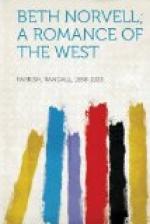It was a narrow section of the ledge, hemmed in by walls of rock and thinly carpeted with grass, a small fire burning near its centre. There was an appetizing smell of cookery in the air, and three figures were plainly discernible. The old miner, Mike, sat next the embers, a sizzling frying-pan not far away, his black pipe in one oratorically uplifted hand, a tin plate in his lap, his grouchy, seamed old face screwed up into argumentative ugliness, his angry eyes glaring at the Swede opposite, who was loungingly propped against a convenient stone. The latter looked a huge, ungainly, raw-boned fellow, possessing a red and white complexion, with a perfect shock of blond hair wholly unaccustomed to the ministrations of a comb. He had a long, peculiarly solemn face, rendered yet more lugubrious by unwinking blue eyes and a drooping moustache of straw color. Altogether, he composed a picture of unutterable woe, his wide mouth drawn mournfully down at the corners, his forehead wrinkled in perplexity. Somewhat to the right of these two more central figures, the young Mexican girl contributed a touch of brightness, lolling against the bank in graceful relaxation, her black eyes aglow with scarcely repressed merriment. However the existing controversy may have originated, it had already attained a stage for the display of considerable temper.
“Now, ye see here, Swanska,” growled the thoroughly aroused Irishman vehemently. “It’s ’bout enough Oi ’ve heard from ye on that now. Thar ’s r’ason in all things, Oi ’m tould, but Oi don’t clarely moind iver havin’ met any in a Swade, bedad. Oi say ye ‘re nothin’ betther than a dommed foreigner, wid no business in this counthry at all, at all, takin’ the bread out o’ the mouths of honest min. Look at the Oirish, now; they was here from the very beginnin’; they ‘ve fought, bled, an’ died for the counthry, an’ the loikes o’ ye comes in an’ takes their jobs. Be hivins, it ’s enough to rile the blood. What’s the name of ye, anny how?”
“Ay ban Nels Swanson.”
“Huh! Well, it’s little the loikes o’ ye iver railly knows about names, Oi ‘m thinkin’. They tell me ye don’t have no proper, dacent names of yer own over in Sweden,—wherever the divil that is, I dunno,—but jist picks up annything handy for to dhraw pay on.”
“It ban’t true.”
“It’s a loiar ye are! Bad cess to ye, ain’t Oi had to be bunk-mate wid some o’ ye dhirty foreigners afore now? Ye ’re sons, the whole kit and caboodle o’ ye—Nelsons, an’ Olesons, an’ Swansons, an’ Andersons. Blissed Mary! an’ ye call them things names? If ye have anny other cognomen, it’s somethin’ ye stole from some Christian all unbeknownst to him. Holy Mother! but ye ought to be ’shamed to be a Swade, ye miserable, slab-sided haythen.”
“My name ban Swanson; it ban all right, hey?”




